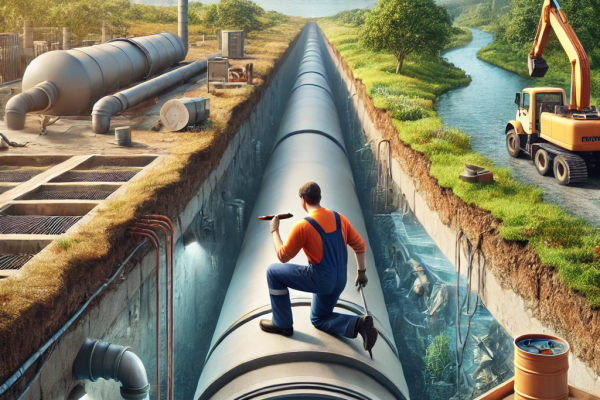
Sewage on the Brink: How Millions of Americans Risk Being Left Without Clean Water and Why Plumbers Are Key to the Solution
Water is an indispensable part of our lives. Nevertheless, millions of people in the United States, according to recent studies, continue to suffer from inadequate wastewater disposal and treatment systems. It sounds paradoxical, considering we tend to view America as a country of advanced technologies and vast resources. However, the reality is that the condition of some infrastructure facilities responsible for the removal and treatment of wastewater leaves much to be desired.
Certain areas, especially rural ones, lack access to reliable sewage systems. Polluted wastewater often seeps into groundwater and surface sources, creating risks for human health and the environment. This scenario is undoubtedly alarming, but instead of panicking, a group of specialists and stakeholders—including engineers, environmentalists, government representatives, and plumbers—has begun developing solutions that could fundamentally change the future for millions of Americans.
A Problem That Remained Silent for Too Long
Polluted wastewater rarely makes headlines until a disaster strikes: a sewage system breach, a sharp decline in drinking water quality, or an outbreak of infectious diseases. Despite its low profile in the media, sewage-related issues affect many residents in the United States.
The Consequences of Neglect
In areas where infrastructure is outdated, weather-related catastrophes such as heavy rain, hurricanes, or floods lead to septic tank overflows and the discharge of untreated effluents. In poorer communities, some are forced to rely on cesspools or lack basic sanitary facilities entirely. These conditions become hotspots for bacterial infections that spread rapidly, exacerbating health risks and highlighting systemic inequalities.
The paradox is clear: one of the most developed countries in the world struggles with sewage problems akin to those in developing nations.
Plumbers on the Front Lines
The Critical Role of Plumbers
Why plumbers? While engineers, contractors, and officials play their parts in sewage system modernization, plumbers are uniquely positioned on the front lines. They encounter real problems daily—whether it’s fixing pipe leaks in a private home or handling major accidents on central sewer lines.
Plumbers also serve as the direct link between residents and infrastructure. They hear firsthand complaints, identify weak points, and offer practical solutions that often inform larger reconstruction projects. Their insights are invaluable when government representatives and engineers tackle modernization efforts.
A Global Approach to Local Problems
A recent report by professional organizations outlines a comprehensive plan for addressing sewage issues across the United States. It emphasizes:
- Increased funding for modernizing outdated treatment facilities and sewage networks.
- Revised regulations to account for the impacts of climate change, such as heavy rains, droughts, and sharp temperature fluctuations that strain pipes and filtration systems.
Why Texas Is a Key Example
Texas, with its diverse climate zones, illustrates the challenges of managing sewage infrastructure. From rapidly growing cities to rural areas, the state faces frequent droughts and floods that strain its systems. Vulnerable wells and septic systems in rural communities highlight the need for innovative solutions, such as digital monitoring and advanced water treatment methods. The Texas experience offers lessons for other states with similarly varied conditions.
The Social Aspect and Inequality
Unequal Access to Sanitation
Sewage system issues worsen social inequality. Wealthier areas can afford regular maintenance and upgrades, while poorer communities often face health threats and increased costs due to neglected infrastructure. A lack of information further compounds the problem, as residents may not know about available subsidies or support programs.
Plumbers and community activists play a vital role in educating the public. Through local initiatives and educational campaigns, they can inform communities about septic maintenance, proper waste disposal, and grant opportunities for infrastructure improvements.
New Technologies: Salvation or Temporary Measure?
Smart Systems and Sensors
Emerging technologies, such as smart sensors and remote monitoring systems, promise to transform sewage management. These tools track pressure, chemical composition, and effluent volumes in real-time, enabling quicker responses to malfunctions. In Texas, pilot projects are testing smart septic systems that automate wastewater filtration and disinfection, reducing environmental risks.
However, the high cost of such technologies poses challenges for small municipalities without sufficient subsidies.
The Role of Professional Organizations and Training Centers
Successful modernization requires a skilled workforce. Professional organizations and training centers provide plumbers with access to the latest materials, tools, and techniques. This is especially critical in rural areas where educational opportunities are limited. By enhancing their skills, plumbers can better protect their communities from the risks associated with outdated sewage systems.
Political Will and Public Support
Driving Change Through Advocacy
Political will is essential for enacting laws that support sewage system renewal. Grants, subsidies, and tax incentives can help municipalities invest in innovative water treatment methods. However, public support and advocacy are equally important. Advisory groups, public hearings, and media discussions raise awareness and pressure officials to act.
How Everyone Can Help
While the problem may seem daunting, individual actions can make a difference. Simple steps like avoiding harsh chemicals in drains, fixing plumbing issues promptly, and supporting local initiatives can collectively improve water quality. Residents can also form community groups to apply for grants and seek professional guidance for infrastructure upgrades.
A Model for Future Generations
Proper wastewater management benefits not only current residents but also future generations. Investing in advanced treatment systems and training skilled plumbers ensures a sustainable water management model. This approach promotes environmental well-being and social equality, ensuring quality sanitation for all, regardless of income.
Conclusion: Time to Act
Delaying action on sewage infrastructure risks escalating problems and costs. Collaboration among specialists, officials, plumbers, and the public is crucial for improvement. Texas serves as both a warning and a beacon of hope, demonstrating the potential of innovative solutions and community engagement.
Plumbers are ready to shoulder their share of the responsibility, offering expertise from minor household repairs to large-scale consultations. But broader public participation and political will are necessary for lasting change. Clean water and effective wastewater management are fundamental rights that we can secure through collective effort.






